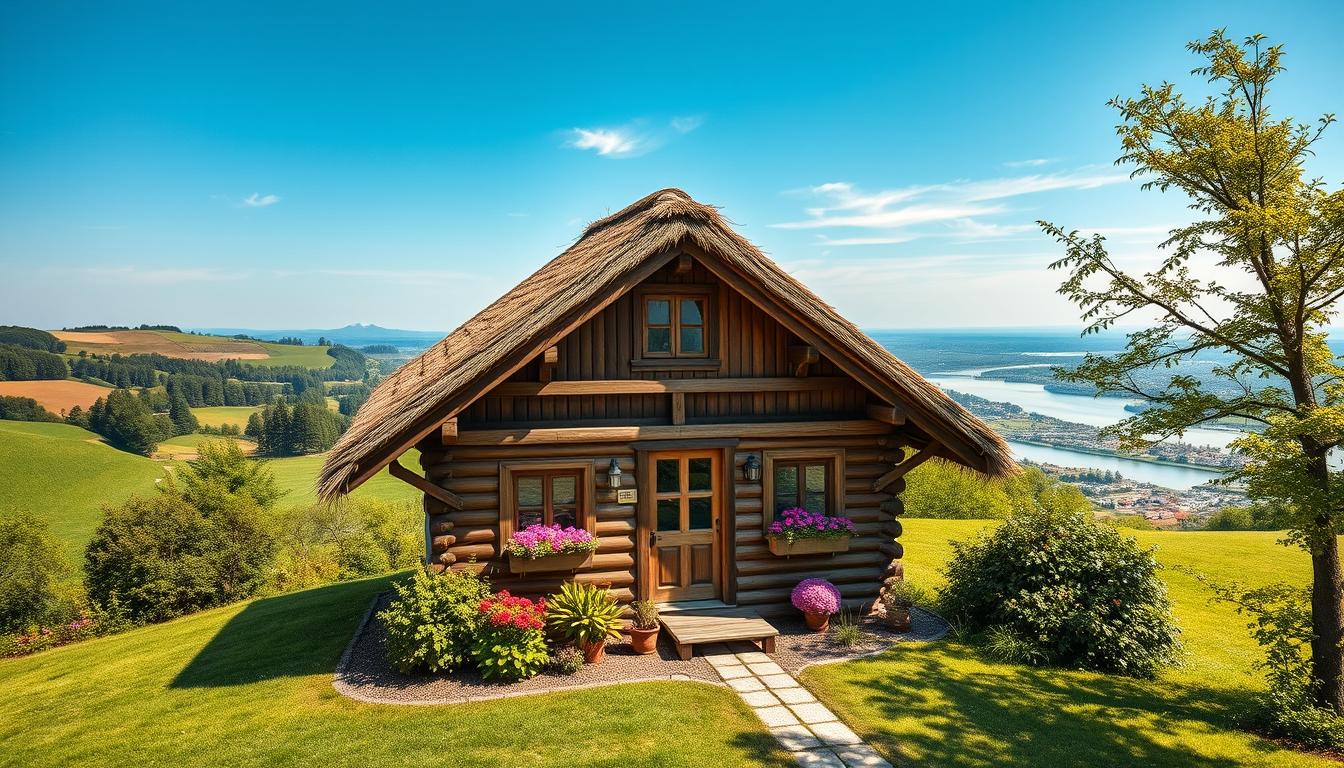Tiny houses are becoming more popular in Hungary. They are seen as sustainable, affordable, and promote a minimalist lifestyle. These homes are perfect for those who want to live in a way that’s good for the planet. They offer a unique, space-saving living option for individuals or couples.
These homes are designed to be compact and eco-friendly. They help people reduce their environmental impact. At the same time, they provide a cozy and well-designed living space.
Living in a tiny house in Hungary is flexible and free. Many of these homes are built on wheels. This makes it easy to move them to beautiful places like Lake Balaton and the Danube Bend.
These homes use eco-friendly materials and energy-saving systems. This makes them even more appealing. A look at top-rated tiny home rentals, like the Cozy tiny house with garden near Budapest, shows how much people enjoy living in them.
For those thinking about downsizing, tiny houses in Hungary are attractive. They offer not just a smaller living space but also a simpler, more fulfilling life. Each tiny house can be customized to fit the needs of its owner. This ensures that every home is perfect for its occupant while encouraging an eco-friendly lifestyle.
To learn more about tiny houses in Hungary, check out our detailed guide on tiny house Hungary.
Key Takeaways
- Tiny houses in Hungary offer a sustainable and affordable living solution.
- The tiny house movement is growing, promoting eco-conscious and minimalist lifestyles.
- Many tiny homes are built on wheels, providing mobility and flexibility.
- Popular locations for tiny homes include Lake Balaton and the Danube Bend.
- Top-rated tiny home rentals in Hungary report high levels of satisfaction from guests.
The Rise of Tiny Houses in Hungary
The tiny house movement Hungary is growing fast. It shows a shift towards living simply and sustainably. Many in Hungary are drawn to this way of life.
The Tiny House Movement
The tiny house movement Hungary is more than just small homes. It’s about living sustainably and building strong communities. A study by Boeckermann (2017) found that community is key for tiny house dwellers.
They value shared experiences and connections. This includes community gardens and potluck dinners. Research by Mangold and Zschau (2019) also highlights the importance of community in tiny house living.
On average, tiny house communities in Hungary have 10 to 30 homes. They cater to different needs and foster a sense of collaboration and support.
Influences from Minimalist Living
The rise of minimalist living Hungary is influenced by global trends. It’s about valuing experiences over material possessions. This fits well with the tiny house lifestyle, attracting those who want to simplify.
Many tiny house communities focus on sustainability. They use eco-friendly materials and energy-efficient designs. This movement is also seen as a response to economic crises, offering financial and environmental benefits.
Popularity Amongst Tourists
Tiny houses are not just for residents but also for tourists. Tiny house tourism Hungary is becoming more popular. Tourists look for unique, eco-friendly places to stay.
These houses offer a special experience, connecting guests with nature. The tourism sector is taking notice, with more interest in tiny house stays. Tiny houses are now found in beautiful spots across Hungary, providing a memorable, green stay for visitors.
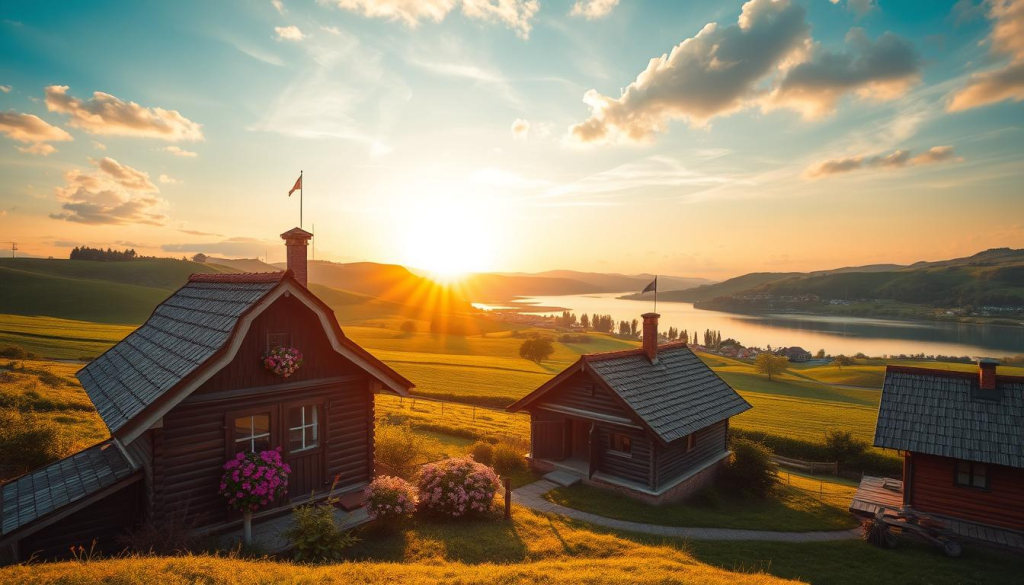
Popular Locations for Tiny Houses in Hungary
Hungary has many beautiful spots for tiny houses. You can find them by lakes or in the city. These places are great for those who love tiny homes.
Breathtaking Spots in Balaton
Balaton is like a Hungarian Sea. It’s perfect for a Balaton tiny house. The area is calm and has beautiful views.
People love staying here. Tiny houses get great reviews, with some having over 300 reviews. They offer free parking, air conditioning, and are good for families.
Being close to nature and clean makes it special. It’s a place you won’t forget.
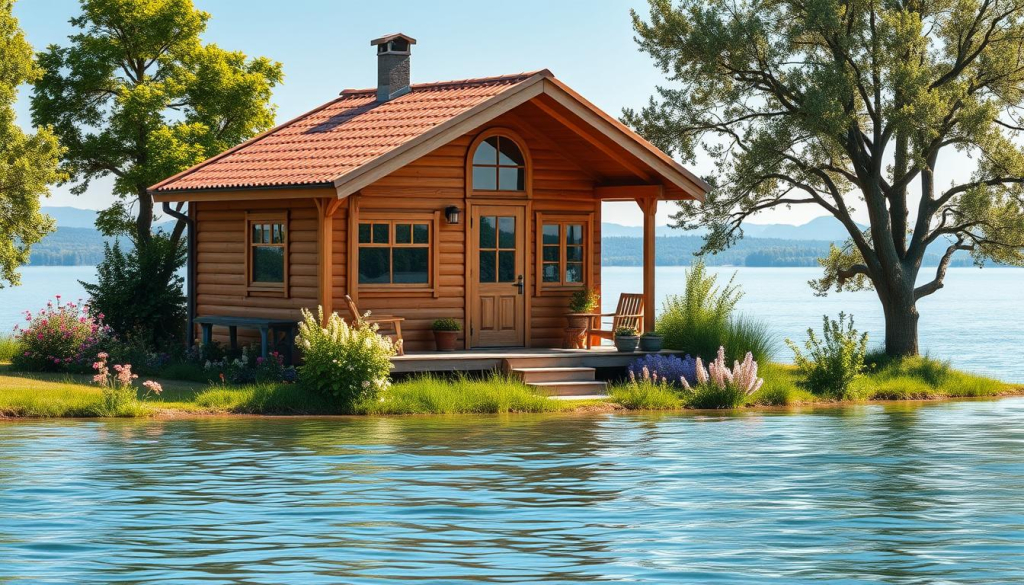
Picturesque Areas around Budapest
If you want a city feel with a tiny home, try Budapest tiny homes. Places like Nagykovácsi and Szigetszentmiklós are great. They mix country peace with city life.
Superhosts give these places high ratings. They’re praised for being close to culture, clean, and having lots of amenities. It’s perfect for short or long stays.
Nature Retreats along the Danube Bend
For those who love nature, the Danube Bend is ideal. The Danube Bend retreats are surrounded by greenery. They’re close to Budapest, making it easy to explore.
Guests love the location and how clean it is. It’s a great place to relax and enjoy nature while being close to the city.
Tiny House Hungary: Key Features and Benefits
Hungarian tiny houses are a showcase of modern design. They are both beautiful and eco-friendly. One key feature is the use of natural light. Big windows and smart placement make rooms bright and energy-saving.
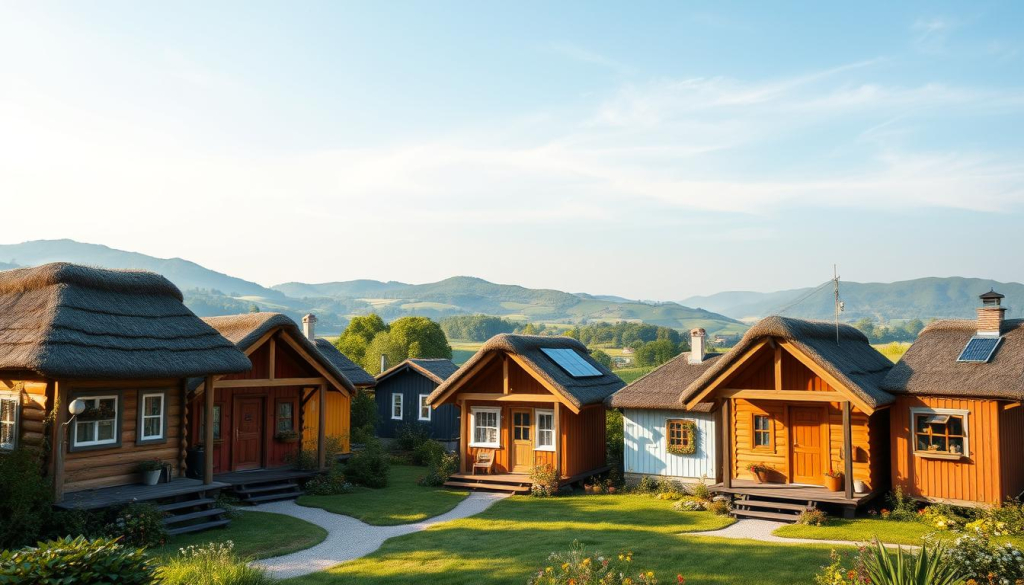
Multipurpose furniture adds to their practicality. Items like fold-away beds and tables make small spaces work well. Plus, they use energy-efficient appliances. This cuts down on bills and helps the planet.
Living in a tiny house in Hungary has many perks. It’s cheaper to keep up than a big house. Plus, it’s less cluttered, which is good for your mind.
The Kabinka cabin by Hello Wood is a great example. It comes in sizes from 12 to 20 square metres. It’s made mostly of wood, making it eco-friendly. It’s built quickly, with a base model ready in six to eight weeks.
Thinking about getting a bigger tiny house? It’s worth it. More space means more comfort and room for guests. You can have different areas for living, working, and cooking. It’s also easier to add your own style and hobbies.
In summary, Hungarian tiny houses offer a special way of living. They follow the principles of minimalism, sustainability, and mobility. This makes them a great choice for those looking for a different lifestyle without giving up comfort or practicality.
Sustainable Living in Hungarian Tiny Homes
In Hungary, the trend of sustainable living is growing, especially in tiny houses. These homes help reduce environmental impact and encourage eco-friendly living. Let’s look at some sustainable practices used in these homes.
Eco-Friendly Materials and Practices
Using eco-friendly materials is a big part of sustainable living in Hungary. Tiny homes often use renewable resources like timber and recycled materials. This cuts down on carbon emissions and supports local economies by using local resources.
Energy Efficiency in Tiny Homes
Energy-saving tiny houses in Hungary are built to use less energy. Their small size means they need less heating and cooling. They also use advanced insulation and energy-saving appliances, which lowers utility bills.
Solar panels and wind turbines are often added. They provide clean energy and make homes more independent.
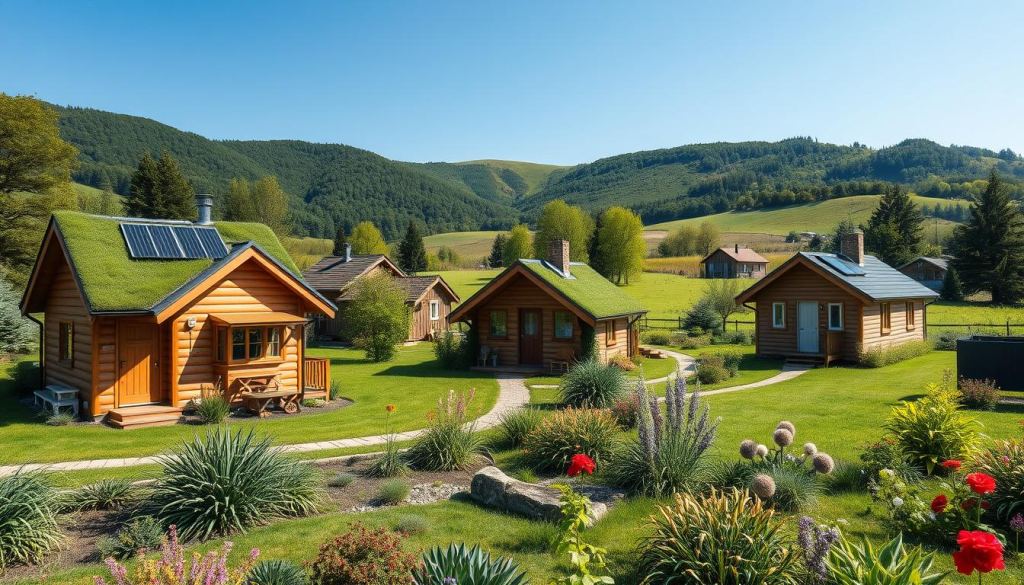
Cost-Savings and Affordability
Eco-friendly tiny homes are also more affordable. They cost less to build and maintain than regular houses. The use of cheaper materials and energy-saving designs helps save money over time.
The 6pack project aims to create a compact energy system for tiny homes in Hungary. It makes these homes even more sustainable and cost-effective.
These innovations show Hungary’s dedication to sustainable living. They offer practical, affordable housing that’s good for both people and the planet.
Conclusion
The tiny house trend in Hungary is more than just a building style; it’s a lifestyle change. Living in smaller spaces helps people enjoy life more than owning things. It creates a community that loves the earth, keeps things simple, and connects with nature.
Investing in tiny houses in Hungary has many benefits. Costs are lower, and you use less energy for heating and cooling. You also save money every month. Plus, it makes life less stressful and improves your well-being.
Tiny houses come with modern features like energy-saving wood and paint. They have top-notch air conditioners and comfy mattresses. They’re easy to move, which is great in places where land is scarce. You can even have them built just for you.
There are also tiny house communities in Europe. They offer a sense of belonging and shared resources. This is especially good for expats who might find it hard to fit in. More about this can be found here.
These homes use eco-friendly materials and the latest tech. The [URL] shows how tiny homes are shaping the future of living. As this trend grows, tiny homes are a key to better living for Hungary.


